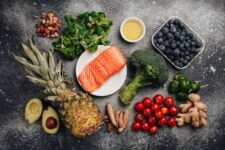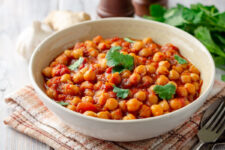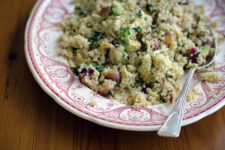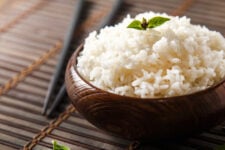Fat is one of the three essential macronutrients needed for optimal health. However, not all fats are created equal, and there is a lot of misinformation on the topic of healthy versus unhealthy fats.
Though the research is still evolving, experts agree that replacing saturated and trans fat with unsaturated fats is beneficial for health, especially in reducing the risk of heart disease.
Learn more about healthy fats and how to incorporate them into your diet below.
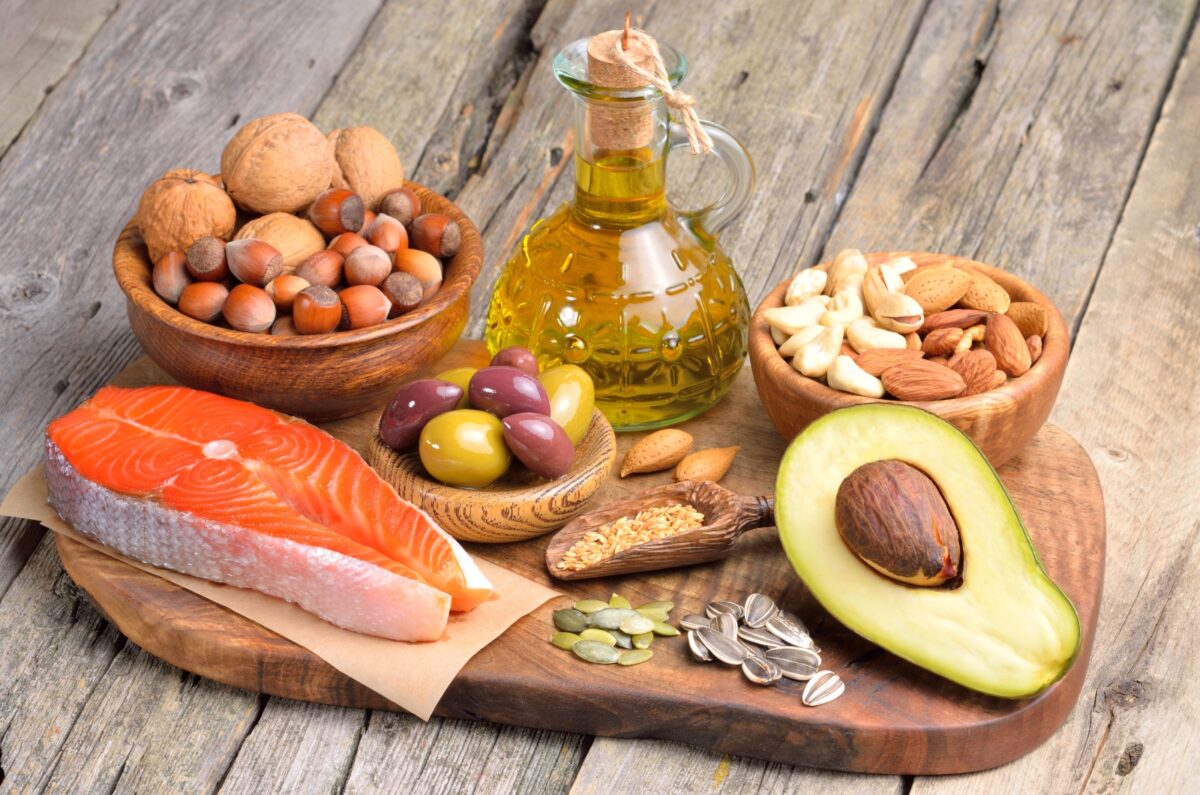
Types of Healthy Fats
Healthy fats are liquid at room temperature and come from plant sources (with a few exceptions). A diet rich in healthy fats brings numerous health benefits, including improved heart and brain health (1).
There are two main types of healthy fats:
- Monounsaturated fats.
- Polyunsaturated fats (including omega-3 fatty acids).
On the other hand, certain types of dietary fat can increase your risk of health conditions when consumed as the primary fat source of your diet. They are solid at room temperature (like butter) and usually come from animal sources (1).
Experts recommend limiting your intake of the following types of fats:
- Saturated fat.
- Trans fat.
Monounsaturated Fats
Monounsaturated fats are liquid at room temperature and turn solid when refrigerated. Foods like olive oil, avocados, nuts, and seeds are good sources of monounsaturated fat.
They are rich in antioxidants and can reduce your risk of heart disease and stroke (1).
Polyunsaturated Fats
There are two main types of polyunsaturated fats– omega-3 fatty acids and omega-6 fatty acids. Omega-3 fats are associated with numerous health benefits, while omega-6 fats are known to be pro-inflammatory (2).
Both types of fat are essential to the body because your body cannot produce them. From a health standpoint, experts agree it’s best to eat more omega-3 fats than omega-6 fats. However, the average Western diet is much higher in omega-6 fats (2).
Polyunsaturated fats are found in foods like canola oil, walnuts, and fatty fish. Like monounsaturated fats, they are high in vitamin E and other antioxidants (3).
Many dietary fats contain a combination of fat sources. For example, olive oil contains mostly monounsaturated fats but also has some polyunsaturated fats (3).
Omega-3 Fatty Acids
Omega-3 fats are a type of polyunsaturated fat that can reduce your risk of heart disease and are primarily found in fish (4).
DHA and EPA are the types of omega-3 fats in fish, and these are the most available form of omega-3 for your body to utilize (5). The American Heart Association recommends eating two servings (3 oz each) of fatty fish weekly, such as tuna or salmon.
Some plant foods (like walnuts and flaxseeds) contain alpha-linolenic acid (ALA), which is converted to omega-3 fatty acids in the body. However, this process is not very efficient (3).
Benefits of Eating Healthy Fats
Healthy fats are excellent sources of nutrients, antioxidants, and anti-inflammatory compounds. Research has linked diets rich in healthy fats with positive health outcomes, including benefits on heart health, brain health, and weight management (6).
Heart Health
Research shows that replacing saturated fats with healthy sources like mono- and polyunsaturated fats can lower LDL “bad” cholesterol and raise HDL “good” cholesterol levels, reducing the risk of heart disease (7).
A diet rich in healthy fats is also linked with a lower risk of heart attack, stroke, and mortality from heart disease (6).
It’s important to note that replacing saturated fat with refined carbohydrates has not been shown to benefit heart health (6).
Brain Function
Healthy fats, particularly omega-3 fatty acids, have been linked to improved brain function. Some studies show that people who regularly consume fish have lower rates of dementia and Alzheimer’s disease (8).
Additionally, replacing saturated fats with unsaturated fats is associated with lower mortality rates from neurodegenerative diseases (6).
Weight Management
Though low-fat diets have been popular for years, they don’t result in superior weight loss compared to other eating patterns. Research shows that the Mediterranean diet, which contains moderate amounts of healthy fats, may benefit long-term weight management (9).
Top Sources of Monounsaturated Fats
The foods highest in monounsaturated fats are minimally processed plant-based fats, including avocado, olive oil, and nuts.
Avocados
Avocados are rich in healthy fats, fiber, and other micronutrients. Research shows that people who eat avocados daily have lower LDL and total cholesterol levels (6).
Eating avocados can also improve the ratio of good and bad cholesterol and the LDL particle size and count (6).
Olive Oil
A staple of the Mediterranean diet, olive oil contains beneficial plant compounds called polyphenols. These antioxidants are anti-inflammatory and have been linked with improved HDL “good” cholesterol, lower triglycerides, and reduced blood pressure levels (6).
Further, one study found that using olive oil in place of butter may reduce the risk of type 2 diabetes in women (6).
Nuts
Research shows that eating one serving of nuts per day significantly lowered total cholesterol and LDL “bad” cholesterol levels. Participants in these studies consumed between one-quarter and one-half cup of nuts daily (6).
Almonds, hazelnuts, and pecans are especially rich sources of monounsaturated fats (7).
Top Sources of Polyunsaturated Fats
For the most health benefits, focus on adding foods rich in omega-3 to your diet, such as fatty fish, walnuts, and flaxseeds.
Remember, while we still need omega-6 fats, having a greater ratio of omega-3 fats to omega-6 in your diet is best. Omega-6 fats are primarily found in vegetable oils, such as (13):
- Sunflower oil
- Corn oil
- Soybean oil
- Cottonseed oil
Top Sources of Omega-3 Fatty Acids
To maximize your omega-3 status, focus first on fatty fish, then on plant sources like walnuts, chia seeds, and flaxseeds.
Fatty Fish
The American Heart Association recommends eating two servings (3 oz each) of fatty fish weekly, such as tuna or salmon (3).
Population-based studies have found that people who regularly eat fatty fish have lower rates of heart attack, heart failure, and coronary heart disease (5).
Examples of fatty fish rich in omega-3 fatty acids include:
- Anchovies
- Tuna
- Salmon
- Mackerel
- Sardines
Walnuts
Walnuts are rich in ALA fats (a precursor to omega-3), fiber, vitamins, and minerals. They are also one of the top food sources of antioxidants.
Studies have linked walnut consumption with improved cognitive function and performance, likely due to their anti-inflammatory action (10).
Flaxseeds
Both flaxseeds and flaxseed oil are rich sources of polyunsaturated fat in the form of ALA. Flaxseeds have anti-inflammatory properties and have been linked with improved heart health (11).
Of note, ground flaxseeds make it easier for your body to absorb and use the ALA.
Chia seeds are also a rich source of ALA and are associated with lower cholesterol, blood pressure, and blood sugar levels (12).
Incorporating Healthy Fats Into Your Diet
You can incorporate more healthy fats into your daily meals and snacks with a few swaps. First, start by cooking with healthy fats like olive oil and avocado oil instead of butter and lard.
Think about ways you can incorporate healthy fats into your snacks. Some examples include:
- Toasted nuts and seeds
- Apple with natural peanut butter
- Avocado on rice cakes
- Chia seed pudding
- Hummus and veggies
Many fast food meals and ultra-processed foods are made with saturated fats, so consider ways to reduce your consumption of these foods and focus on adding minimally processed plant foods to your diet.

